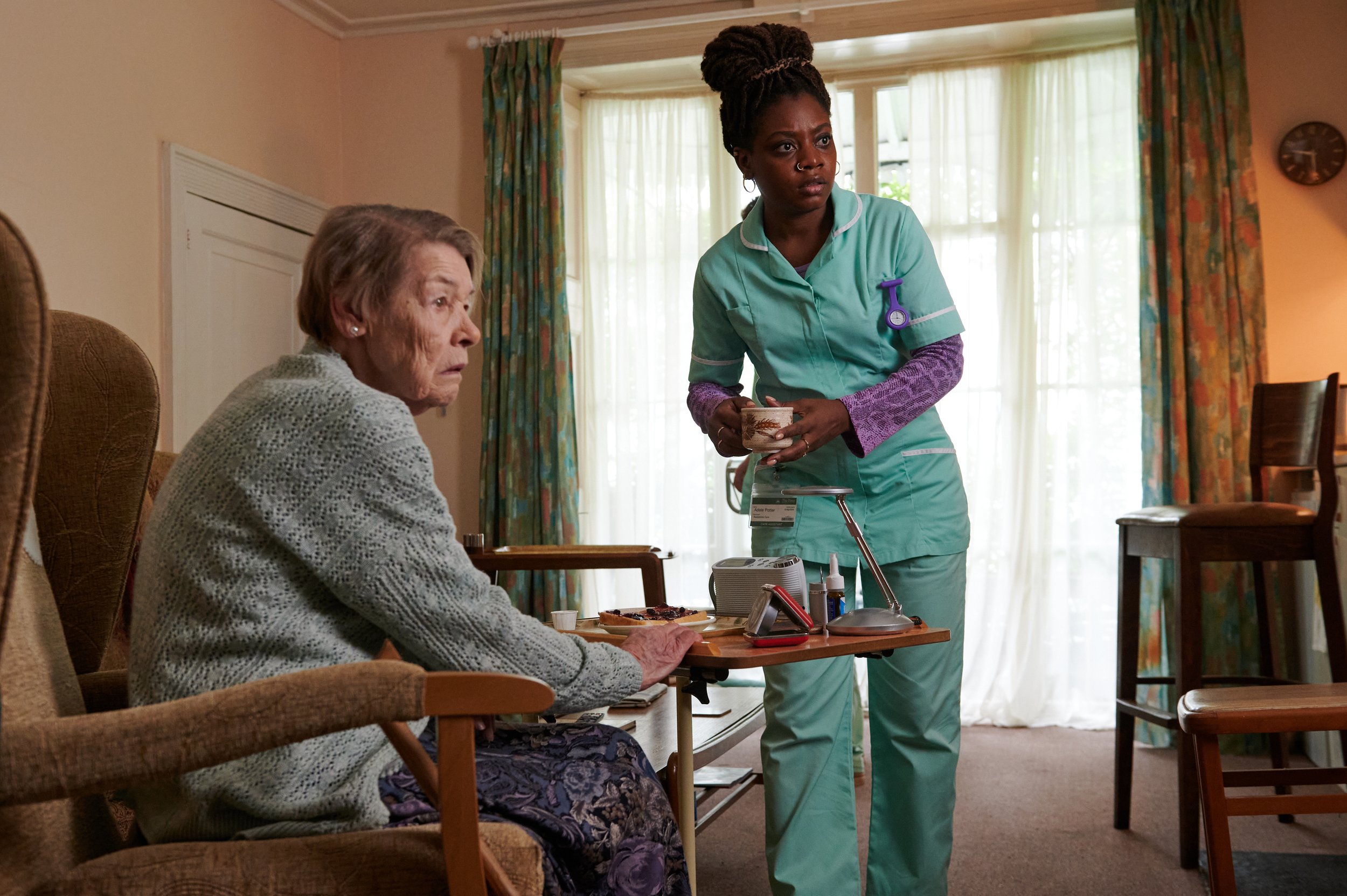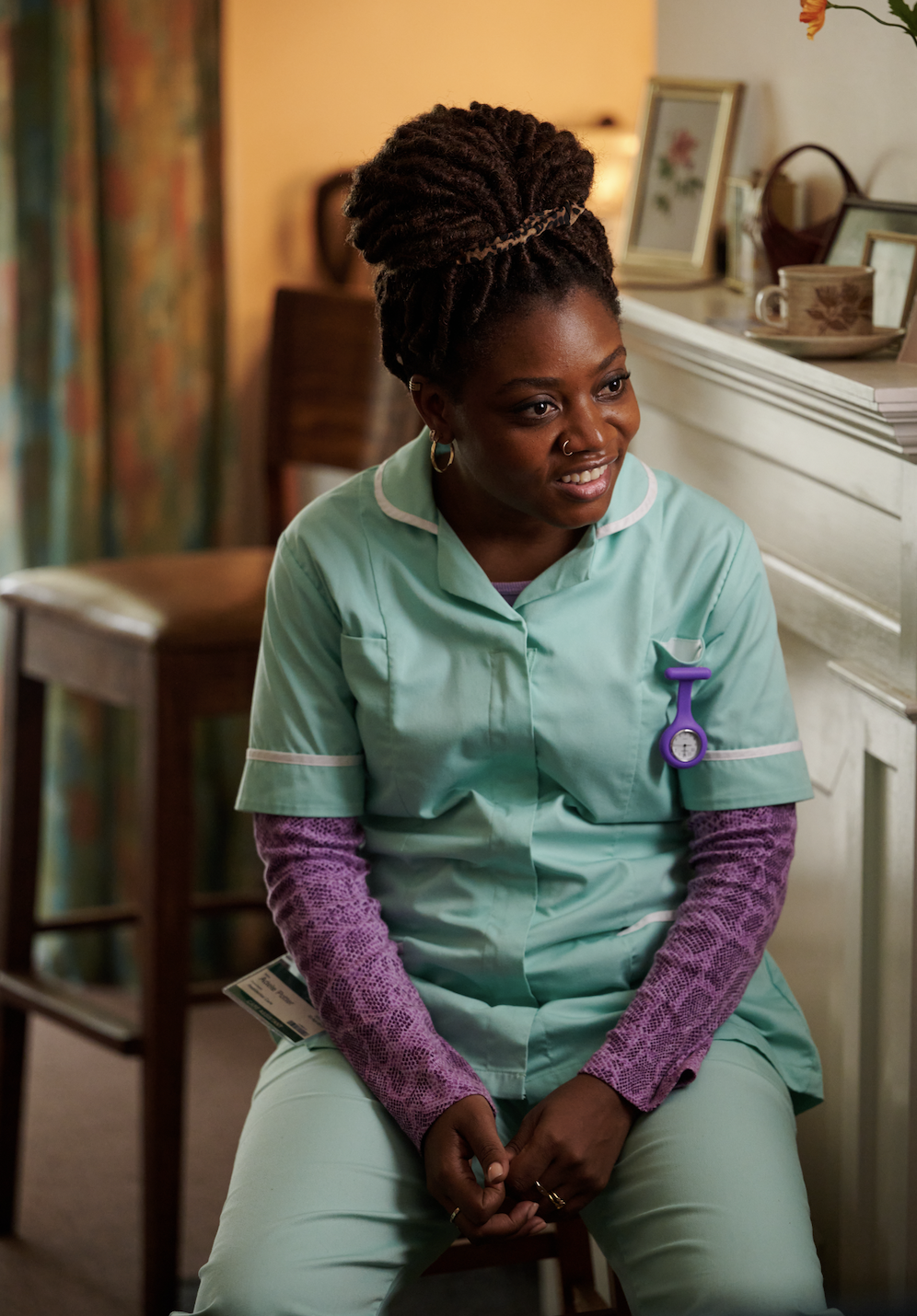In Conversation With Danielle Vitalis: Her Role In The Great Escaper and How History Leans Into Our Present and Future.
For this interview, BLK Brit is in conversation with esteemed actor Danielle Vitalis about history - both British and Black, creative processes, work-life balance and representation. Insightful, playful and observant, Danielle has a spark that is both inspiring and magnetic. With a great body of work spanning across television, theatre, radio and film, you can catch one of her most recent performances in the upcoming feature The Great Escaper releasing in cinemas 6th October 2023.
In The Great Escaper, the interactions between your character Adele and Rene were both good writing and brilliant acting - like throughout the rest of the film. How was it playing a factual person and being around those great actors?
“I’ve played somebody in theatre that is a real person before and with Horrible Histories as well, it’s kind of fictionalized but it’s making a historical point. The most important thing is the story in that sense, I do what I need to to be the character, but we were all really focused on serving the story and you don’t always get that across a production. And it was really nice to be in that vibe where everybody was supportive of it. We also recorded in a working old people’s home - I don’t know who told them to do that?! (laughs). It was a bit chaotic. But we really did get the sense of what it would be like and it allowed us to embody the vibe of the place. Just working with people like Glenda Jackson and Michael Caine, man, these guys they were born in like the 30’s and it was cool talking to Glenda about just how being on set has changed over time. She remembered when they would do everything in studios, and they would set everything out and take a few hours then people would come on and just do it. And then she’s talking about pagers being on set, then phones; because I had an Apple watch and somebody had text me and was like, ‘Oh girl,’ and she [Glenda] was like, ‘What you doing?’ Then she was talking about the advancement of technology and she wasn’t really here for it to be honest (laughs). But it was just inspirational watching them and listening, it was one of those jobs where you could just sit and take people in, you know.”
You have been on some very notable programming - when you go onto set, sometimes do you read the script and negotiate with directors about your character from your interpretation?
“Yeah, it’s a fun one because it’s like every director is different - a lot of them are really open to your interpretation of it and I think it’s such a collaborative process. It’s fun to be allowed to play in the way that you might. And a lot of them just let you get on with it. I think that when you have directors that have a really strict vision for something, I don’t know if I’ve experienced that to be honest because their job is to yes direct but trust the actor and that they know that character and role they’re playing. And it’s not your vision that’s the most important, it’s to serve the story and sometimes if you do have differences of opinion on something we have to work towards one vision and we’ll see in the edit (both laugh).”
Playing Adele, Black people aren’t always made visible in portrayal of care or medical roles, similar to actual life when Gina Yashere had to highlight the erasure. How important is it to see us in these spaces?
“It’s crazy to me that in this year we are still having to have conversations about representation. Especially with the Windrush generation of people like my grandmother who were so pivotal in the building of the NHS and the structural implications of what is now a great healthcare service, well, sometimes… but it’s important to me that we live in a multicultural world and genders are expanding, representation in any way and any aspect is a win for everybody. And so I’m always going to be on the lookout. I might be in something and they want a representational aspect and say like, ‘Yeah, then go into the bathroom and get water to drink,’ and I’ll be like huh? (both laugh). It don’t quite go like this, no. And I think as important as it is to have representation, we need to also make sure it is authentic and that’s my role in this.”
A very real example of those nuances where contributions make a difference! As you mentioned Windrush and you’ve been involved with projects around this topic, what is your relation to it?
“My mum’s side is St Lucian and I lived there for quite a while when I was younger and then we came over to Hackney... why?! Why would you do that?! In the 90’s.. nahh… (both laugh). When I did the Windrush project I had this conversation with my grandma because I took her to the screening and she met Lenny Henry, she was gassed. It was only during that time we started having conversations while I was filming about her experiences. She came after HMT Empire Windrush with her sisters on a boat to London and it was freezing cold and met their mum there. She bought them tights and coats, and they changed in some department store. It was really crazy, like why has nobody ever spoken about this in our family; these hidden stories that we don’t know from this generation. It’s nice to be able to get them out while they’re still here and with us. Because it’s in the media more, we’re researching it more, but these guys have been carrying this since wha’ day! And it’s like rah, I’m so interested to sit down and talk to people about their experiences because we’re now representing it. Like I did an episode of Time Wasters and we went back to then and the visual portrayal of it was one of the most beautiful that I’ve been a part of, it’s nice when you get that balance of what it was.”
It’s something that needs to keep traction and keep building as there are definitely more stories about that time that are important, Caribbean and others. You also write as well, what’s it like being on that side of the process?
“Ah, it’s long man! (both laugh). I’m enjoying it but I’m like, guys! I think I did a project the other day, think it was last year; you know Black people always say the other day for any time in the last five years (both laugh). The writer said to me, they’ve been working on this for ten years. I said, ‘Pardon me?! That’s a very long time mate to be in the creation of something’. Yeah, I’m working with an amazing exec at the BBC, her name’s Maddeline Addy. People have always said I should write, but how? Then I got offered this mentorship programme, a BBC Creators residency and [Maddy] had been instrumental in guiding me through the process. Because it’s a lot of stuff man, and a lot of people and essentially about pitching and it’s very performative. It’s an advantage for me as a writer/performer to be able to go in and sell as people know my work, but it is intense and hard, but you just have to do it. When I did the film with Judd Apatow for Netflix, he was like, ‘You’ve just gotta write it,’ and I was thinking, this guy! (laughs. But I deeped it and it’s true; if you want to be a writer, to be something you have to just do it and then you’re that something. And not stopping.”
What are some of the frustrations of being a creative?
“I think I was working for about three years consistently, I wasn’t having breaks and going on and on, even during the pandemic and that was weird. Because in some places, like I did something in Guadeloupe and they classed me as a key worker and I was like bro, I’m literally just playing pretend but whatever enit (laughs). But I think when I stopped by choice because I was a bit tired and a bit not happy, it was resetting, recalibrating to be in a place where I wasn’t validated by work. I tried to find other things that I cared about again. I’d forgotten because I was just doing work, work, work and started to feel like, what am I doing this for? Especially if you’ve been on a job that’s really difficult it just made me think, is this what I wanna do? And I really had to step away and was like okay, it is, I just needed that break. I’ve been going to the gym, seeing my family lots and living my baby girl lifestyle. My plants are happy, they were slumped and now they’re joyful (laughs). Yes, my work will live on and people think what I do is great, but you need to sit down with yourself.”
Have you ever experienced any discrimination of any sort throughout your career?
“I might get to the late stages of a project like auditioning for something and then they’ll be like, ‘We’ve gone a different direction.’ I’ve started to take that as we don’t want the character to be Black. Because often when I see the person I’m like… who knows. You just don’t know. I’ve tried to get that out of my head with the casting process - it’s not up to me, I can do what I can and then forget about it, like whatever if it comes it comes, I’ll just have a milkshake or something (laughs). I think there’s also instances with questions around intellectual property where somebody not from that background can take things and say is theirs, but that’s where it gets difficult because what is ‘yours?’ . Where discrimination is obvious, I just say something like, ‘Hello, what’s this going on?’ - I’m very on the day, I’m a Libra, so it’s very hard for me to witness injustice in any form and just be okay with it. But often times, that means people around will come to me and tell me their problems, like guys, I’m not the equity rep (both laugh). There’s a Jamaican saying, ‘Duppy know who fi frighten,’ I’m not afraid to talk about it [injustice] through fear, I’m just not going to have it. It may be systemic oppression, but it’s life enit.”
Finishing up, Black British talent seems to have definitely grown and to a wider audience, which is amazing to see increasing opportunities, what are your thoughts on this?
“I love it man, keep ‘em coming, keep churning them out, that’s what I say. I feel like the more the better, there’s space for everybody here. And I think the hardest step is getting in, that’s changing, there’s loads of different ways of casting now which allows for more diverse communities to be involved in the process. I think there’s still a lack of representation with example South Asian and all different demographics and I feel like in writing stuff, we’re able to portray the world as we see it and what we would like to reflect. So, when I see my UK baddies and goodies getting love it’s so encouraging for everyone else just trying to do it. And more life to everyone. Also, I think that there’s difficulty in people thinking going to America is where it’s at, yeah, it can be, but also I feel like if you can do good stuff here well and consistently, try to do it here first. Because if you can, you’ll do it well over there [USA] too. Because you know when you just move out the ends like, nobody is looking after the ends now, just gentrification and people coming. So, I feel like if I can do something in my community and yeah, you can still move, but do work there and be a representation of that place. But it’s not easy man, I understand when people go, even me, they’re always telling me, ‘Danielle, why don’t you go?’ but I haven’t really looked at it like I have to do this, you know. Whatever comes, comes enit; see how it goes. But that has also come from over fifteen years professionally doing this job, it’s maybe been the last five or six years where I’ve had the blessing of being like nah, I don’t wanna do that, because I don’t need to; I do projects that I want to do. Every job I do now is like a political act, I really care about this stuff and I’m privileged to be able to do that now.”
That’s brilliant. Thank you for your contribution amplifying Black British talent and voices.



